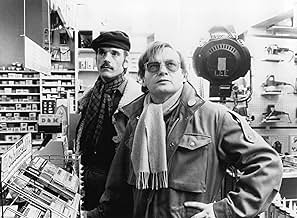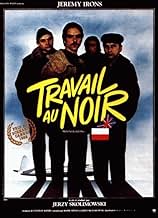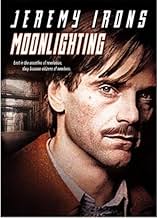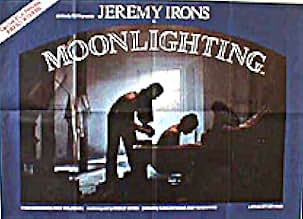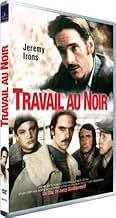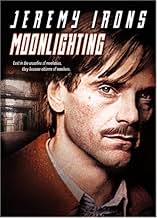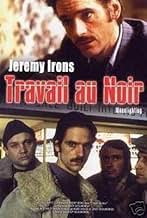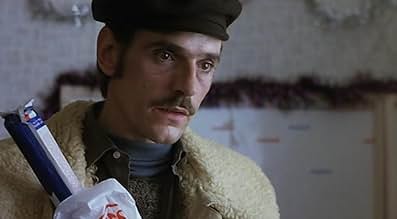ÉVALUATION IMDb
7,3/10
3,6 k
MA NOTE
Trois maçons polonais et leur contremaître, Novak, viennent à Londres travailler au noir. Novak, autoritaire, est le seul à parler anglais. Lorsqu'il prend connaissance du coup d'Etat en Pol... Tout lireTrois maçons polonais et leur contremaître, Novak, viennent à Londres travailler au noir. Novak, autoritaire, est le seul à parler anglais. Lorsqu'il prend connaissance du coup d'Etat en Pologne, il tait la nouvelle à ses compatriotes...Trois maçons polonais et leur contremaître, Novak, viennent à Londres travailler au noir. Novak, autoritaire, est le seul à parler anglais. Lorsqu'il prend connaissance du coup d'Etat en Pologne, il tait la nouvelle à ses compatriotes...
- Prix
- 3 victoires et 3 nominations au total
Jiri Stanislav
- Wolski
- (as Jirí Stanislav)
Michael Sarne
- Builders' Merchant
- (as Mike Sarne)
Histoire
Le saviez-vous
- AnecdotesSkolimowski's Kensington house in West London was in real life undergoing renovation at the time the film was made. (Moonligthing, 1982)
- GaffesWhen one of the workers paints the door frame on the outside of the building and clears away the electrical wire, part of the lintel is already painted white. Later, when Banaszak climbs up the ladder, the lintel has not yet been painted. Then, in the close-up in which he gets the electric shock, a good part of the lintel is painted white again, and in the next shot, when he falls off the ladder, only a tiny part is painted white again.
- ConnexionsFeatured in At the Movies: The Best Films of 1982 (1983)
Commentaire en vedette
I was in my teens in the early 1980's when this story takes place, and we were going through hell in my country. But by all accounts, Britain was not really a paradise in the 80's either. You can feel that in every frame, every line of dialogue.
A bunch of Polish builders arrive in London to renovate a house belonging to their boss. The foreman, Nowak, played quietly and brilliantly by Jeremy Irons, is the only one that speaks English. Their money is sufficient only for the tools, building materials and barely surviving.
This is a slow-burner film with every face hiding a deep anxiety, anger or fear, it's a wonderful experience for those who can appreciate true cinema. Irons carries the film single-handedly (often with inner monologue, since there are not many people to talk to) with few facial expressions but each one telling books of emotions.
You can literally taste the frustration of every character: the builders, working hard but not able to enjoy the western life that they finally see but cannot touch, are angry. (There's a very funny scene where one of them wants to buy Coca Cola on their first trip to the supermarket, exclaiming "Coke!" with childish glee, but their money is so limited that they can't afford even that.) The neighbors are angry, because the builders make too much noise. Most of all, Nowak is angry for a lot of reasons, although he never shows it: He misses his wife, and has growing doubts about the intentions of his boss about her. He speaks English, but doesn't always understand the subtleties of what the British people say. He has to deal with the men, the meager finances, the neighbors, the skip workers, and of course the house itself, which looks like it will come down if someone sneezes hard.
Two things change the course of their dull days dramatically: the money obviously won't last, and Nowak starts to come up with little schemes to get extra food from the supermarket using the same receipt. He's quite inept, but lady luck is often on his side. But most importantly, he hears that a military coup has taken place in his homeland. He faces a terrible dilemma: does he tell the men? He must, since they all have families at home, but then the work will never finish, and they really need the income. (There's no way they'll be allowed back, anyway) Or does he not tell them? Then the work may finish on time, but how will he keep the men from finding out themselves, when their weekly phone calls from home suddenly stop?
It's basically a hero story. What's a hero? A Marvel guy in leotards, speaking in one-liners? Or a man who does the right thing, at his own cost, knowing that he will never be appreciated? Nowak does the right thing. He hides the truth about the coup, thus keeping the men from rushing to the border and probably getting arrested. He gets the work done on time. He sees attractive women, but never chases them: they only remind him of how much he loves and misses his wife. He steals, but not from regular people: he only steals from the supermarket, and steals food and basic necessities only. And all the while he keeps his mouth shut. He doesn't "share his journey" or any other nonsensical stuff we love oh so much nowadays. He doesn't expect rewards, admiration, medals, approval, praise. He does the right thing, because he's a man, and that's what a man does. Even the final scene, where he tells the men about the coup and gets beaten by them for hiding the truth so long, is a tribute to this: He doesn't try to justify it, he knows he did the right thing but also hurt his men, so he takes their punches like a man.
As one other reviewer mentioned, it's a movie for the discerning viewer. There's nothing wrong with Marvel movies or action movies, but there's a lot wrong with thinking that's what movies are all about.
A bunch of Polish builders arrive in London to renovate a house belonging to their boss. The foreman, Nowak, played quietly and brilliantly by Jeremy Irons, is the only one that speaks English. Their money is sufficient only for the tools, building materials and barely surviving.
This is a slow-burner film with every face hiding a deep anxiety, anger or fear, it's a wonderful experience for those who can appreciate true cinema. Irons carries the film single-handedly (often with inner monologue, since there are not many people to talk to) with few facial expressions but each one telling books of emotions.
You can literally taste the frustration of every character: the builders, working hard but not able to enjoy the western life that they finally see but cannot touch, are angry. (There's a very funny scene where one of them wants to buy Coca Cola on their first trip to the supermarket, exclaiming "Coke!" with childish glee, but their money is so limited that they can't afford even that.) The neighbors are angry, because the builders make too much noise. Most of all, Nowak is angry for a lot of reasons, although he never shows it: He misses his wife, and has growing doubts about the intentions of his boss about her. He speaks English, but doesn't always understand the subtleties of what the British people say. He has to deal with the men, the meager finances, the neighbors, the skip workers, and of course the house itself, which looks like it will come down if someone sneezes hard.
Two things change the course of their dull days dramatically: the money obviously won't last, and Nowak starts to come up with little schemes to get extra food from the supermarket using the same receipt. He's quite inept, but lady luck is often on his side. But most importantly, he hears that a military coup has taken place in his homeland. He faces a terrible dilemma: does he tell the men? He must, since they all have families at home, but then the work will never finish, and they really need the income. (There's no way they'll be allowed back, anyway) Or does he not tell them? Then the work may finish on time, but how will he keep the men from finding out themselves, when their weekly phone calls from home suddenly stop?
It's basically a hero story. What's a hero? A Marvel guy in leotards, speaking in one-liners? Or a man who does the right thing, at his own cost, knowing that he will never be appreciated? Nowak does the right thing. He hides the truth about the coup, thus keeping the men from rushing to the border and probably getting arrested. He gets the work done on time. He sees attractive women, but never chases them: they only remind him of how much he loves and misses his wife. He steals, but not from regular people: he only steals from the supermarket, and steals food and basic necessities only. And all the while he keeps his mouth shut. He doesn't "share his journey" or any other nonsensical stuff we love oh so much nowadays. He doesn't expect rewards, admiration, medals, approval, praise. He does the right thing, because he's a man, and that's what a man does. Even the final scene, where he tells the men about the coup and gets beaten by them for hiding the truth so long, is a tribute to this: He doesn't try to justify it, he knows he did the right thing but also hurt his men, so he takes their punches like a man.
As one other reviewer mentioned, it's a movie for the discerning viewer. There's nothing wrong with Marvel movies or action movies, but there's a lot wrong with thinking that's what movies are all about.
- suicidea
- 1 févr. 2023
- Lien permanent
Meilleurs choix
Connectez-vous pour évaluer et surveiller les recommandations personnalisées
- How long is Moonlighting?Propulsé par Alexa
Détails
- Date de sortie
- Pays d’origine
- Langues
- Aussi connu sous le nom de
- Moonlighting
- Lieux de tournage
- sociétés de production
- Consultez plus de crédits d'entreprise sur IMDbPro
Contribuer à cette page
Suggérer une modification ou ajouter du contenu manquant


